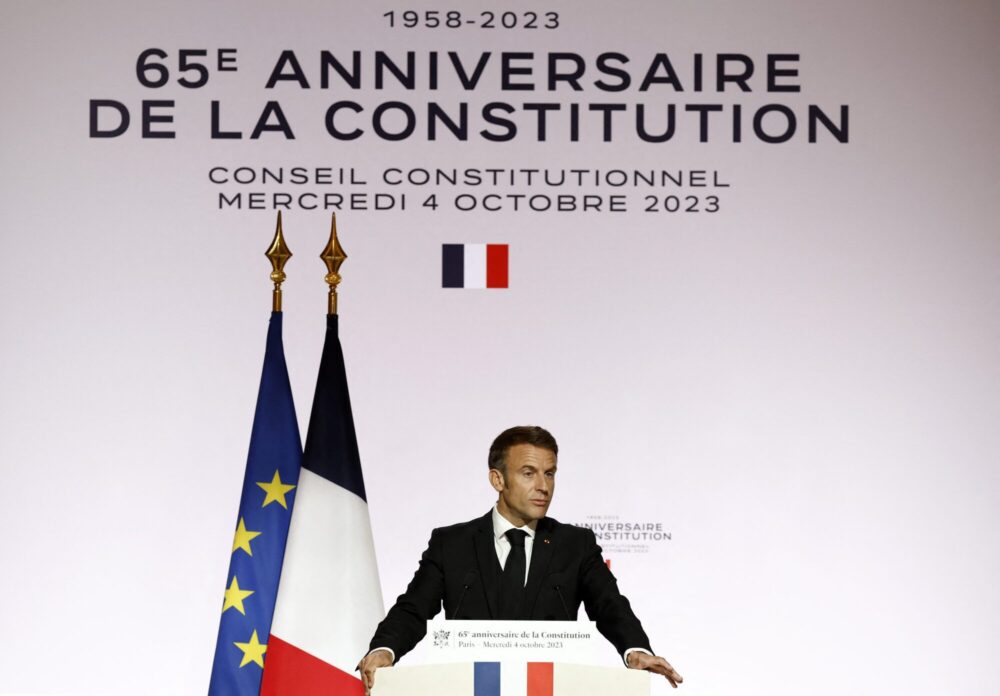
As France marked the 65th anniversary of the constitution of the Fifth Republic, President Emmanuel Macron presented to the Constitutional Council the broad outlines of the constitutional reform he wishes to propose in the coming months, in a clever statement designed to win him support from both the Right and the Left.
For many months, the question of a possible reform of the constitution has been stirring up the French political world. Jean-Luc Mélenchon, leftist leader of La France Insoumise, has been campaigning for years for a radical change towards a Sixth Republic, with a system that he would like to be more parliamentary and less presidential. On the Right, the Rassemblement National is in favour of a more limited reform of the constitution, which would make it possible, for example, to incorporate certain specific points such as national precedence or to hold a referendum on immigration.
In his speech on Wednesday, October 4th, Emmanuel Macron praised the stability of the present constitution—the second longest-lasting regime since the French Revolution—and proposed a number of ideas that go in several directions and are likely to satisfy the expectations of parties across the whole political spectrum.
He spoke out in favour of extending the scope for referendums, which should please the Rassemblement National. As the constitution of the Fifth Republic established in 1958 currently stands, only a limited number of political issues can be the subject of a referendum. The idea would be to broaden the range of subjects covered by this voting method. Another subject, frequently called for on both the Right and the Left—it was a major demand of the Yellow Vests movement—is simplifying the use of the shared initiative referendum process, which allows ordinary citizens to propose a question for referendum on the basis of popular mobilisation. The current procedure is extremely complex and Emmanuel Macron is considering simplifying it, although he has not given any indication of the new arrangements envisaged.
He also touched on two other more controversial subjects. The first was decentralisation, a particularly controversial issue in France’s traditionally Jacobin and centralising political life. It was this very issue that led General De Gaulle to resign in 1969, after winning a majority of ‘no’ votes in a referendum designed to validate his major decentralisation project. Today, the French President has in mind the Caledonian and Corsican issues, two territories to which he wishes to give greater autonomy without going as far as independence.
Macron is also considering incorporating a reference to the right to abortion into the constitution. This idea was first mooted a few months ago, when the U.S. Supreme Court put an end to the Roe v. Wade ruling and gave the States back the right to rule on abortion. The ensuing debate brought the issue of defending the ‘right’ to abortion to the forefront of French politics, in a bid inspired by the American Left. A number of French people have called for this right, which is supposedly under threat, to be enshrined in the constitution.
Emmanuel Macron is in favour of such a move. The left-wing MPs who recently tabled bills on the matter are campaigning for a specific constitutional reform to enshrine the right, rather than drowning it in a more general provision. But Emmanuel Macron’s political skill lies precisely in the fact that he intends to integrate the right to abortion into the other areas of reform. This is a convenient way for him to trap his political opponents, who may agree with one or other of the measures but not necessarily with all of them but will be pressured to accept the constitutional reform in its entirety so as not to give up points to which they are attached.
This is typically the trap that is set for the Rassemblement National with a lure such as broadening the scope of referendums or simplifying the shared-initiative referendum that it supports. The issue of the right to abortion in the constitution is not the subject of consensus within the Rassemblement National. In previous debates, the party was split three ways on the issue: one third abstained, one third supported and one third opposed. In the run-up to a constitutional debate, it is thus possible that the RN will vote in favour of constitutional reform in its entirety, including abortion.
For the moment, the President of the Republic has only launched a number of proposals. He hopes that the debates will continue over the coming months, both in the National Assembly and in the Senate, before arriving at a comprehensive constitutional reform text that will be put to the vote of the two houses meeting in Congress in Versailles.
